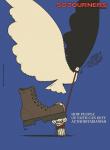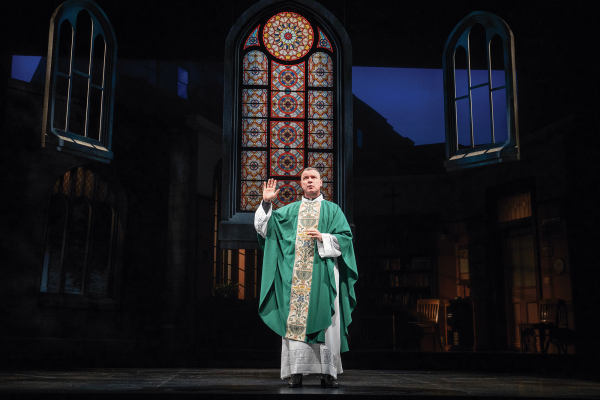IN THE LAST nine months, John Patrick Shanley has had three plays on and off Broadway: revivals of “Doubt” and “Danny and the Deep Blue Sea,” and the debut of “Brooklyn Laundry.” While the timing is completely coincidental, the three plays cover much of his career: “Danny” premiered more than 40 years ago, and “Doubt” recently turned 20.
Despite the decades between them, these plays share a surprisingly consistent take on faith. Though raised Catholic, today Shanley demurs from identifying with any one religion. In a recent interview he told me, “It’s like when you’re among theists, you get handed a piano with 88 keys and told you can only use 13. I think that human spiritual experience is first of all mysterious and second of all, extremely rich and varied. Any reduction is just that, a subtraction from the breathtaking panoply available to us through the history of the spirit.”
In “Danny,” “Doubt,” and “Brooklyn,” God is not a comfort. Instead, Shanley’s characters are confronted with the radical, unavoidable uncertainty of reality — and challenged to go forward anyway. For Shanley, the whole idea of faith demands stripping away anything sentimental or reassuring. It isn’t faith if it isn’t well and truly a leap.
A godless landscape
NEAR THE END of Shanley’s raw-edged 1983 two-hander “Danny and the Deep Blue Sea,” Danny and Roberta sit in a bedroom, contemplating the possibility of a future together. Though he’s only just met Roberta, Danny wants to be with her forever. Roberta, looking back upon her past and the terrible things she has done to her family, cannot agree. “I’m bad,” she tells Danny over and over.
Danny reassures her that we all make terrible mistakes but can’t get through to her. So, he tries a different tack: “I forgive you. Everythin’ you done,” he says. “You’ve felt bad long enough ... you paid for what you done.” Ultimately Danny’s forgiveness enables Roberta to finally get past her brutal self-recriminations and shame.
Essentially, Shanley wrote a scene that recreates the Catholic sacrament of reconciliation, and yet there is no miracle healing or otherwise absent divinity swooping in to bestow forgiveness. On Shanley’s stage, the only ones to trust are other people, damaged and messy as us.
The trauma of doubt
THE PLAY “DOUBT,” for which Shanley won the Pulitzer Prize, concerns the principal of a Catholic grade school in 1960s Brooklyn who fears that her parish priest is molesting Donald, a new Black student. Over the course of nine tightly written scenes, the principal, Sister Aloysius, works with the child’s teacher, Sister James, to try and find a way to expose Father Brendan.
While Aloysius is unwavering in her belief that Brendan has been doing harm to Donald, in the end what enables her to get him removed is not evidence of his current wrongdoing, but information from a sister at his last assignment about other instances of abuse. The information is enough to get Brendan to transfer elsewhere. Only then does Aloysius admit to James that her efforts to protect Donald and her school involved deception.
Aloysius insists that Brendan’s decision to ask for a transfer is the proof that she was right. But then, out of nowhere, her steely exterior begins to crack. Looking upon a horrified James, she reveals, voice cracking, “I have such doubts.”
In the original stage version, Cherry Jones played Aloysius with such stony resolve that just the words and a slight tremor in her voice were enough to shake the audience. Amy Ryan, in the new production, brings a softer, less cold take to the character. In that last moment, she unexpectedly collapses in tears; James holds her, Pieta-like.
In the preface to “Doubt,” Shanley describes the play as a parable about the inescapable reality of doubt in human existence. “Each of us is like a planet. There’s the crust, which seems eternal. We are confident about who we are,” he writes. But under the surface, he argues, “There is another You,” a “wordless Being” aware that all that self-definition and certainty is fiction. Doubt is not something to be avoided, Shanley argues — rather, doubt is the occasion of blessing: “that crucial moment when I renew my humanity or become a lie.”
In this context, Aloysius becomes all of us, fighting to be certain in a reality that absolutely refuses to ever grant that. And faith, as a result, becomes something else — not unblinkered confidence but a series of hesitant, fragile steps into the dark.
Friends, not fictions
“BROOKLYN LAUNDRY,” WHICH ran at the Manhattan Theater Club from February to April, tells the story of Fran (Cecily Strong), a woman longing to have a family, who meets Owen (David Zayas), the owner of her laundromat. The two of them couldn’t be more dissimilar — him endlessly sunny, her the quintessence of New York bedragglement. When he reveals that he was hit by a car, and the settlement he received has brought him so much freedom, she wishes something like that might happen to her. Owen warns her to be careful. “You wanna get hit by a car?” he asks. She quips back, “At this point, it doesn’t sound so bad.”
Then, over the course of five scenes, we watch Fran get her dream, but at a cost.
While the play offers an endearing, often funny story, it also includes painful twists that come without warning, piling up one after another in ways that can be hard for viewers to accept. This is not how stories normally work. But in a sense, that’s Shanley’s point: The rules of dramatic structure often serve as a kind of implicit divinity, providing guard rails that protect the audience from feeling overwhelmed. Reality doesn’t care about the rhythms of rising action, climax, falling action, and resolution. You can lose two loved ones in a week; be fired from your job and then get cancer; get hit by a car and then die of a staph infection. In “Brooklyn,” Shanley forces us to confront the brutality of life’s randomness.
And yet Shanley doesn’t leave us or his characters without a kind of hope. Twice in the play, including when all seems lost, one character extends a hand to the other, saying, “Two is stronger than one.” You can almost hear the critics’ pencils scribbling in frustration at the lack of subtext, but this idea is at the heart of Shanley’s vision; it’s where not only “Brooklyn” but “Danny” and “Doubt” end up. With God ever in the distance, if noted at all, all we have is each other. Having a friend or partner is no barrier against the cruelties of life, or the radical uncertainty of human existence. But if we are willing to take that leap, as scary and ambiguous as that is, it can help.

Got something to say about what you're reading? We value your feedback!







